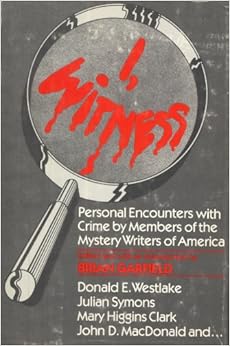I'm writing this week's post from Atlantic Beach, NC, where my son Dash and I are spending the week visiting with my parents and my brother. It's almost squarely the middle of our trip as I'm beginning this post, and it's been a fine, fun week already—and
fine and
fun also describe nicely the beach reading I brought down with me.
While most of my reading throughout the years relates to work of some kind or another—texts on my syllabi, a book I'm slated to review, readings for an anthology I'm helping edit or a contest I'm helping judge—I do try to balance out those stories or books with a few solely for pleasure. For our getaway this week, I packed
Forever and a Death by the late Donald Westlake. The book began as a film treatment by Westlake, who was asked to contribute a story to the James Bond film franchise—but when elements of the book proved too political for the filmmakers, the film itself was never made, and Westlake wrote a novel instead, one never released during the author's lifetime. Hard Case Crime finally published the book just last week—the third of Westlake's previously unpublished works to be released by Hard Case since the author's death.
Donald Westlake and James Bond?!?! As a fan not only of Westlake's writing but also of the Bond series in both books and film, how could I resist? I snapped it up immediately.
Before we get to that Westlake + Bond equation, I want to mention the Bond + beach equation. My family has had a home somewhere along North Carolina's Crystal Coast for most of my life, and even the anticipation of reading a new Bond novel in this setting brought back several fond memories, since I discovered so many of Fleming's original books at the beach and then too the subsequent series by John Gardner, who began writing his own Bond novels when I was in my early teens—perfect timing for me as a reader. I distinctly remember being in our house in Emerald Isle one weekend during the school year when I was supposed to be pushing through Homer's
Odyssey (at left is the cover of the W.H.D. Rouse translation we'd been assigned) and yet being drawn instead to Fleming's
Spy Who Loved Me, such an unusual and fascinating book in the series as anyone who's read it knows. (As I recall, I balanced things out by rewarding myself with a little Bond for each section of Odysseus's journey I pushed through. And thinking about it now, aren't there many similarities between Odysseus's travels and Bond's own travails? Tempting Circe, the threatening Cyclops, twists and troubles at every turn of an international adventure.)
Speaking of Gardner: Though I don't remember his books as clearly, I do remember enjoying them very much, and I should add that I'm generally fascinated by what other authors have done with the character and the series. I still haven't read Kingsley Amis's
Colonel Sun, the first non-Fleming Bond book, and I never got around to Raymond Benson's contributions, but in recent years I've very much admired the various treatments offered by Sebastian Faulks, Jeffery Deaver, and William Boyd—the ways each of these authors have balanced the iconic character/story against their own interests and aesthetic temperaments. (I leave Anthony Horowitz out of the list here only because I haven't read it yet either.)
So it was with some mix of both nostalgia and anticipation that I opened up the new Westlake—and found myself immersed immediately in what seemed familiar terrain: a powerful, wealthy villain in the first stages of a diabolical plan that would ultimately prove catastrophic for millions of people. Between Westlake's deft prose, the short chapters cross-cutting between several characters' perspectives, and cliffhangers at every turn,
Forever and a Death has proven a joy from the start—and yes, the perfect beach read, even without the fact that so much of the novel's thrilling opening section takes place on the water.
And yet, more than 200 pages into it as I write this post, one perhaps key element of a James Bond novel seems missing—namely, James Bond himself.
Having read only small bits of advance press on
Forever and a Death—more about its backstory than the story itself—I'll admit that I did expect some Bond-like figure here in one form or another. Maybe not Bond by name, of course, and who knew whether the character would be more Connery or more Craig or more Moore? But certainly he would be a secret agent of some kind, missioned and skilled and licensed to kill, right?
Whatever those expectations, however, my enthusiasm for the book hasn't waned a bit, even as Bond himself has failed to show up. On the contrary, I'm actually finding myself intrigued in fresh ways by that central character's absence—imagining the process by which Westlake must have reworked this story from the original film treatment, the decisions he must have made in translating that original story into this new one.
I understand that there's an afterword here by a producer from the Bond franchise, and I've hesitated so far looking at it for fear of plot spoilers. But I'm hoping that the essay will offer some glimpses at the original treatment and some insights into how
it became
this.
In the meantime, though, I'm just enjoying the ride.
I know many of my fellow SleuthSayers are devoted Bond fans too from previous posts here—so how about a quick question: What's your favorite Bond book not written by Ian Fleming? From what I'd read myself (see exceptions above), I'll vote William Boyd's Solo, and my review at the Washington Post detailed the reasons why. Your choice?
(Or for folks who aren't Bond fans, what author continuing another author's series ranks as your own favorite?)













